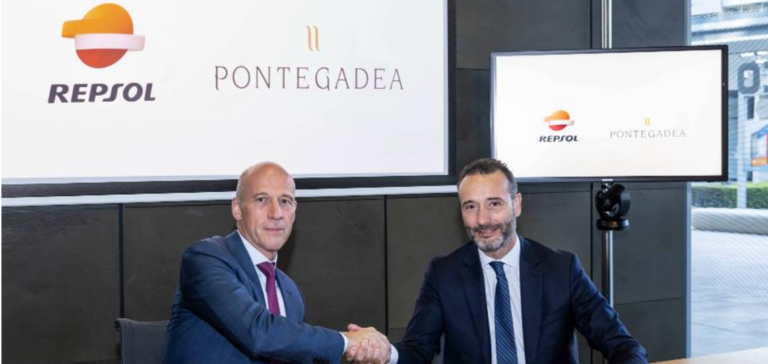Pontegadea, Amancio Ortega’s investment company, continues to expand in the renewable energies sector. According to two sources close to the matter, the company is close to concluding an agreement with Repsol to acquire a 49% stake in a portfolio of wind farms and photovoltaic plants in Spain. This potential acquisition marks a further step towards diversifying Ortega’s investments in clean energy.
Pontegadea joins forces with Repsol for renewable energies
Pontegadea has already acquired minority stakes in energy assets, such as a 5% stake in the renewable and hydrogen unit of Enagas, the Spanish gas network operator. The Repsol renewable projects being sold have a total capacity of around 600 megawatts, and the deal values them at around 700 million euros ($747.18 million), according to sources. An agreement could be reached as early as next week, according to one of the sources. A Repsol spokesman declined to comment on the matter, while a Pontegadea spokesman said, “As usual, we have no comment on rumors concerning ongoing market operations.”
The Potential of Repsol’s Renewable Projects
The production of renewable electricity depends on many factors, such as location, asset type and the amount of sun and wind. According to one estimate, the portfolio will generate electricity equivalent to the average annual consumption of over 400,000 Spanish households.
Repsol Continues its Transition to Renewable Energies
This operation is part of Repsol’s strategy to finance its transition from fossil fuels to renewable energies by selling minority stakes in renewable projects. The company aims to reach 20 gigawatts (GW) of installed capacity by the end of the decade, and has been active on the M&A front. Last year, it sold a quarter of its renewable energy unit to Crédit Agricole Assurances and Energy Infrastructure Partners, an asset manager. More recently, it entered the US onshore wind market with the purchase of renewable energy developer ConnectGen. The Spanish oil company has also sold interests in other Pontegadea projects. In 2021, Repsol sold Pontegadea a 49% stake in another wind farm for 245 million euros.
The Positive Environmental Impact of the Agreement
Other companies, such as Spain’s Iberdrola, are following the same strategy, selling stakes in more advanced projects to finance new ones.
Pontegadea posted a net profit of 2 billion euros last year, against 1.6 billion euros in 2021, mainly thanks to Inditex dividends. The company holds a majority stake in Inditex and has diversified Ortega’s investments into sectors such as real estate, the main area of interest for many years, and energy, where it has also acquired a stake in the Spanish electricity grid operator.
Pontegadea’s investment in renewable energies in partnership with Repsol marks an important step in the transition to a more sustainable future. This operation reflects the growing trend for companies to turn to clean energies in response to environmental challenges and increasing pressure to reduce carbon emissions. As Repsol continues to implement its strategy of switching from fossil fuels to renewable energies, Pontegadea reinforces its commitment to a greener future.






















